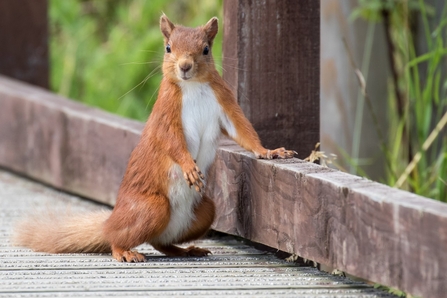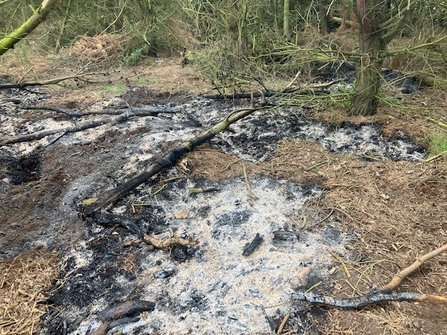Sophie Irving, Hauxley Wildlife Discovery Centre Information Assistant at the site of the woodland fire. Image by: Magnus Clements.
Fire on a second Druridge Bay nature reserve
The call follows a fire in the woods at its Hauxley nature reserve on Friday morning, more than likely started as a result of a camp fire put out on the Thursday evening but left to smoulder overnight and re-ignite on the Friday morning when the wind picked up!
The fire was discovered by Hauxley volunteer Pete Lazenby on his morning inspection of the woods.

Red squirrel at Hauxley. Image: Tim Mason.
If it hadn’t been discovered when it was, the blaze would have been far more damaging to the reserve and its very dry trees which are home to over 100 species of young birds at this time of year and the resident red squirrels, not to mention stoats, weasels, hedgehogs and foxes.
Although any real damage was averted, the smouldering in the leaf litter meant it was difficult to extinguish. Luckily staff and volunteers were able to contain the flames before the fire service turned up to ensure it was totally out.
All in all, it took about four hours from start to finish to make the area safe.

Hauxley fire site. Image by: Alex Lister.
This is the second fire on one of the wildlife charity’s Druridge Bay nature reserves in under a month. Towards the end of July, the north east section of its East Chevington reserve went up in flames when vandals set fire to the pond dipping platform and most of the boardwalk that melted into the pond, destroying the newts, frogs, dragon flies and damselflies living in it.
Alex Lister Northumberland Wildlife Trust’s Druridge Bay Landscape Manager says: “All our reserves are under more pressure than ever before as temperatures rise and changing weather patterns mean they are more susceptible to wildfires.
“In this instance, the camp fire wasn’t extinguished properly and, because of the dry undergrowth, smouldered and re-ignited because of the wind.
“Luckily our volunteer Pete spotted the fire. If it hadn’t been for him, precious habitat would have been destroyed, possibly for decades.
“Our message is clear. Enjoy our wonderful wild places, but do not light camp fires on them and act responsibly.”
